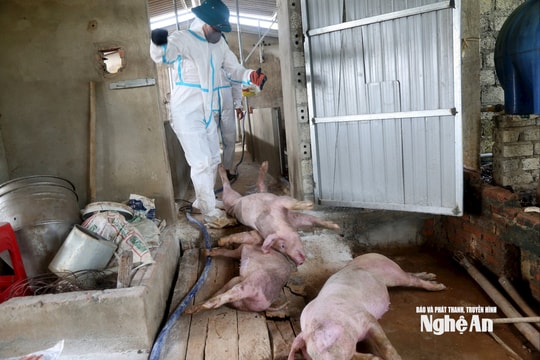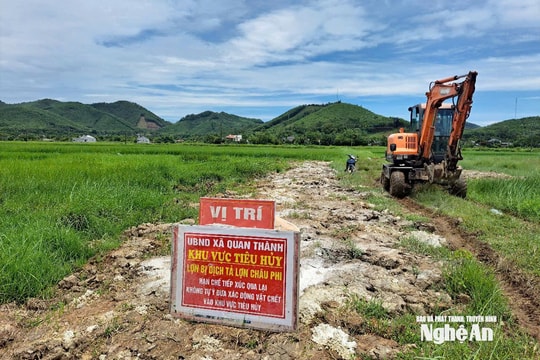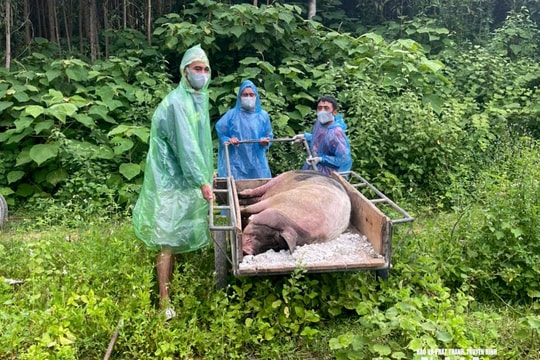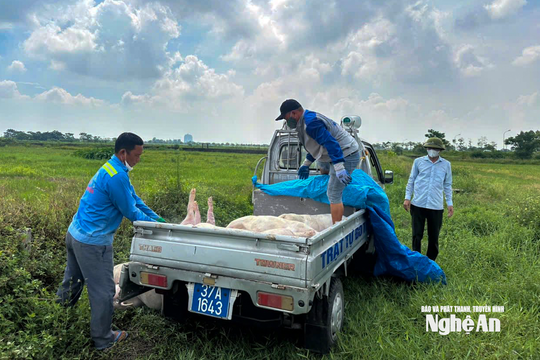Concerns about herd restoration due to African swine fever
(Baonghean) - African swine fever is evolving unpredictably, therefore, many livestock farmers in the province are implementing the motto "empty pens, empty pigs", saying no to importing pigs from outside to minimize the disease.
Do not re-herd in epidemic areas
These days, Mr. Nguyen Van Nhan in Nam Xuan commune (Nam Dan) is focusing on cleaning the pig farm area to prevent disease. At the beginning of March, when African swine fever had not yet appeared in Nghe An, he sold a litter of 7 pigs.
Since then, his pig pen has remained empty, with no new batches added. Mr. Nhan shared: "Following the news and radio, I see that the African swine fever epidemic is getting more complicated. Although I have been raising pigs continuously for 20 years, I am not importing pigs at this time because I am worried that the breeding pigs may be infected with the disease."
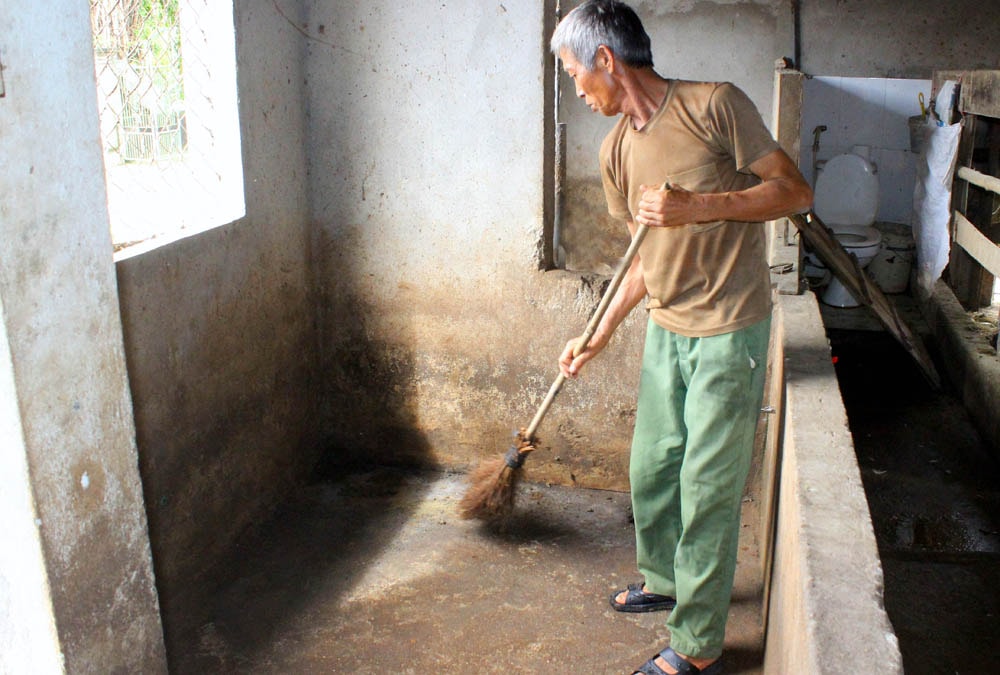 |
| Mr. Nguyen Van Nhan in Nam Xuan commune (Nam Dan) cleans the barn to prevent re-herding during the epidemic. Photo: Quang An |
That is also the common mentality of pig farmers in Nam Xuan commune - one of the localities with a large pig herd in Nam Dan district.
After the outbreak of the epidemic in Nam Dan district, Nam Xuan commune has increased propaganda to the people and allocated funds to buy 300 kg of lime powder and 30 liters of chemicals to prevent the epidemic. Because it is located in the epidemic buffer zone, the government recommends that households maintain their existing herds and not import pigs from outside. Households that have sold pigs should not re-herd at this time to avoid risks.
In Nghi Loc district, after the outbreak in Nghi My commune on April 30, livestock farmers have implemented the policy of "closing doors and locking locks", determined not to import pigs from outside, especially in localities near Nghi My commune.
As a locality with a large livestock herd, and located near Nghi My commune where the epidemic broke out, the government and people of Nghi Van commune (Nghi Loc) are raising their vigilance and disease prevention as a top priority.
Mr. Nguyen Van Khanh - Vice Chairman of Nghi Van Commune People's Committee said: According to a survey, recently, many households in the commune have not imported pig breeds because of fear of disease; many households have left their barns empty or switched to raising other livestock and poultry such as chickens, ducks, cows, goats... This not only limits disease but also maintains income from livestock farming.
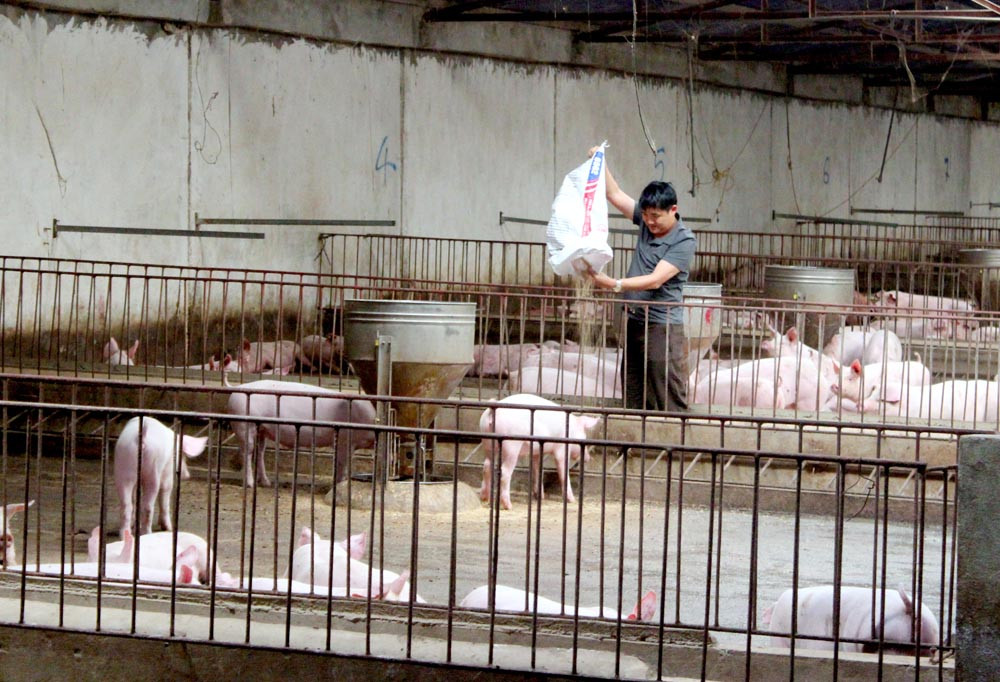 |
| People in Nghi Van commune (Nghi Loc) take care of pigs with the motto of keeping the doors closed and the bolts locked. Photo: Quang An |
Because people are limiting herd restoration, the price of piglets is currently falling sharply. Mr. Cao Van Hoang - Owner of a pig farm with a scale of 1,200 pigs in Hamlet 1, Nghi Van Commune (Nghi Loc) said: Before the epidemic, each piglet weighing 7 kg cost from 1.2 to 1.3 million VND, now it only fluctuates from 900,000 to 1 million VND and is still difficult to sell.
The whole district has about 40,000 pigs. Besides banning the trading and transportation of pigs in and out of the epidemic area, advising people not to re-herd at this time is also a safety measure to prevent the disease from spreading to other localities.
Be careful in places where the epidemic has been declared over.
After the People's Committee of Quynh Luu district announced the end of African swine fever in Quynh My and Quynh Hung communes, the purchasing, slaughtering and use of pork has returned to normal in this locality. However, the district also advised households with pigs infected with African swine fever not to rush to re-herd and continue disease prevention measures.
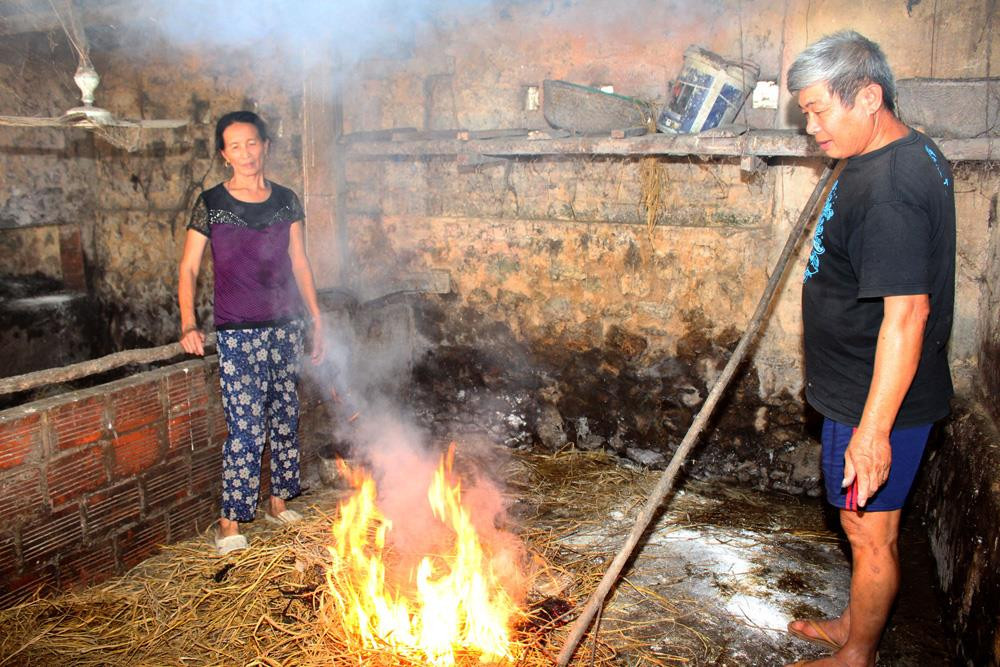 |
| Farmers in Quynh Hung commune, Quynh Luu district, are cleaning their barns and are not in a hurry to restock even though the epidemic is over. Photo: Viet Hung |
Mr. Hoang Van Lan's family in Hamlet 7, Quynh My Commune (Quynh Luu) was the first household in Nghe An to be affected by African swine fever, with a total of 22 pigs being destroyed (including 2 sows and 20 piglets). After more than a month of declaring the end of the epidemic, the family has not rushed to re-herd but is still focusing on cleaning the barn and spraying disinfectants daily.
Mr. Lan said that African swine fever is complicated and can reappear at any time. Although the epidemic has been declared over, the family has not yet re-herded. Veterinary officers from the commune and district have advised and instructed on how to clean the barn, sprinkle lime powder and spray disinfectant. It is expected that the family will resume raising pigs in about 2 months.
During the recent epidemic prevention campaign, the commune used up 30 liters of chemicals and 4 tons of lime powder to spray disinfectants at the commune's entrances and exits and at livestock farms. Although the epidemic has ended, the locality continues to buy 1 ton of lime powder and distribute it to livestock farms to spread throughout the barns. At the same time, it is recommended that livestock farms with epidemics should not rush to re-herd, but continue with disease prevention measures and disinfect barns, waiting 2-3 months before resuming livestock farming.
Through discussion, Mr. Nguyen Van Lap - Deputy Director of the Department of Agriculture and Rural Development said: For localities where African swine fever is occurring, the province does not encourage herd restoration because of the potential risk of spreading the disease, especially in erratic weather conditions.
For localities that have declared the end of the epidemic or have never had a pig epidemic, people can re-herd based on the actual situation of the locality. However, the source of the pigs must be clearly checked. When re-herding, they must be fully vaccinated.
However, if the herd restoration situation continues, the possibility that after the epidemic ends, the pork supply will decrease seriously, prices will be pushed up, and farmers and consumers will face difficulties. Therefore, herd restoration must be monitored and calculated properly by local authorities, functional agencies and people.

.jpg)
.jpg)
